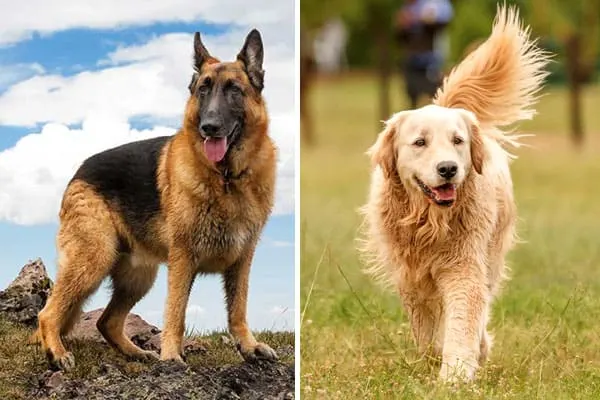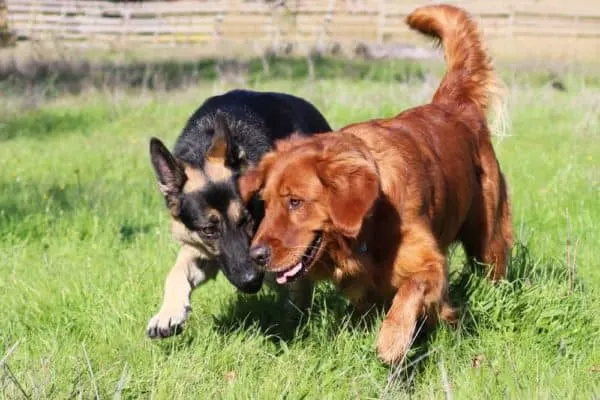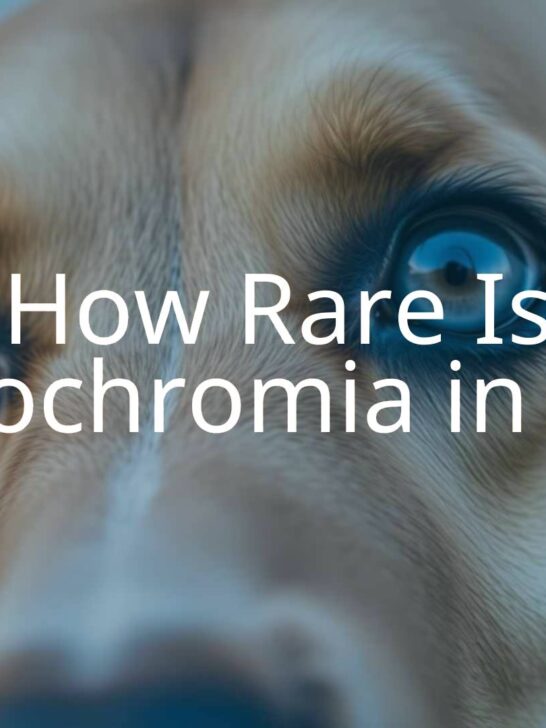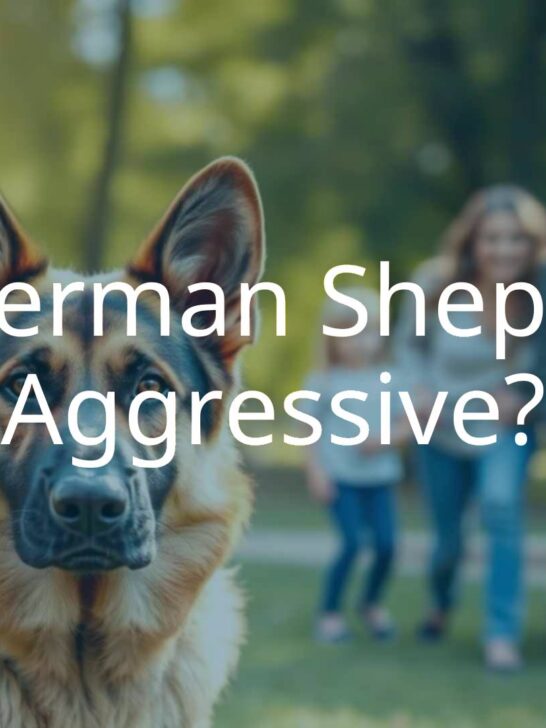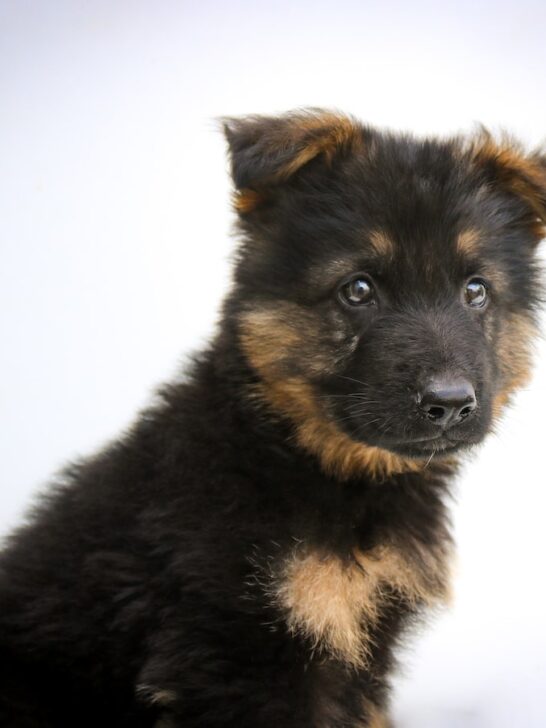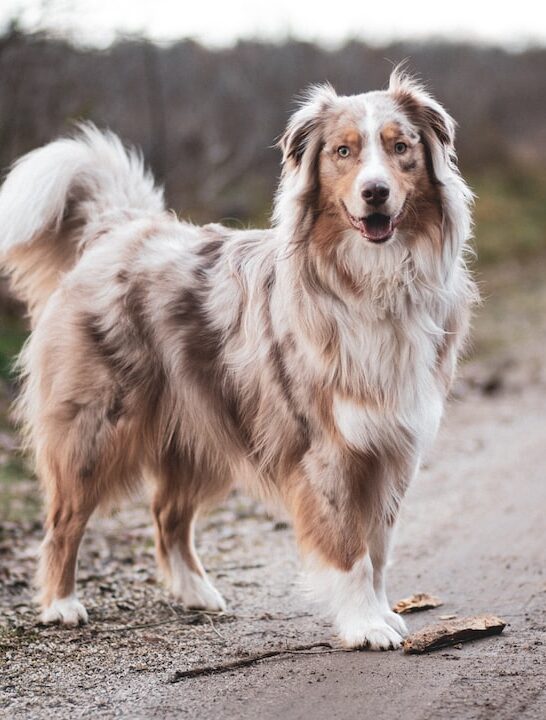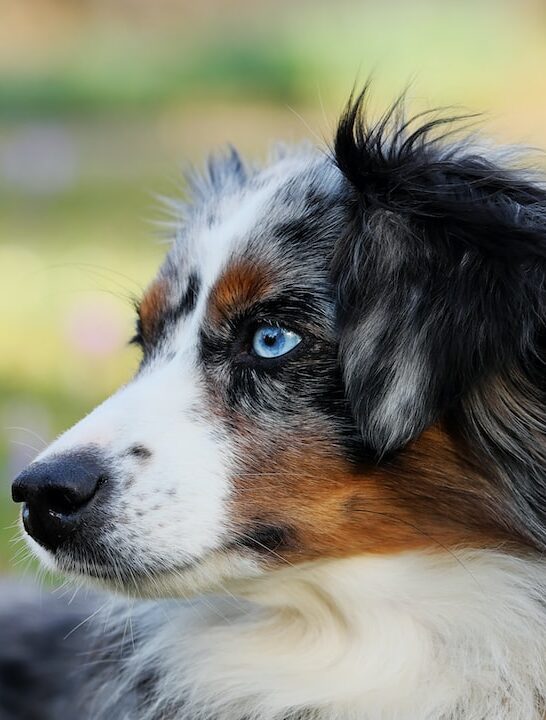Do German Shepherds and Golden Retrievers Really Get Along That Well?
They’re both big dogs that are similar in size and enjoy immense popularity thanks to traits that make them excellent family companions. Both dogs also have similar energy levels and working backgrounds.
If you’ve ever encountered these breeds, you may wonder if they get along nicely? Or maybe, you already have one of the two breeds and are wondering if adding a German Shepherd or Golden Retriever to your household is a good idea.
In short, German Shepherds and Golden Retrievers can get along very well. As with any new pet introduction, you will need to give the dogs time to adjust to each other.
Why Are German Shepherds and Golden Retrievers Suitable For Each Other?
According to Loyal Goldens, a similar size is just one thing that makes these dogs suited to life in the same household. GSDs and Goldens have many other traits in common.
German Shepherds and Golden Retrievers both have high intelligence levels, which is a common trait that makes these breeds popular as service animals. These dogs are also ideal for therapy and emotional support needs.
Even though these breeds are intelligent, they are also reasonably calm. All dogs, regardless of the breed, require appropriate stimulation. When a dog has the right level of stimulation, they will be better behaved.
Both GSDs and Goldens will require plenty of interaction with their human family members. Living out in the backyard all the time is not a suitable life for these dogs. Play with each other, and activities like walks make a huge difference.
How Similar Are German Shepherds and Golden Retrievers?
According to Kelly Wilson, the German Shepherd is the second-most popular breed in the United States, while the Golden Retriever is third.
Some attributes that make these breeds so popular include being good with children, as well as having a playful nature when the time is right! Both dogs also have a strong tendency to be loyal to their family members.
However, owners should remember that these breeds have different histories and were bred for different activities. Shepherds are herding or flock guardian dogs, while Retrievers are hunting dogs.
What Are the Origins of German Shepherds and Golden Retrievers?
German Shepherds originated in Germany during the late 1800s. The Shepherd breed developed as herding dogs that possessed superior instincts and working skills.
Golden Retrievers originated in Scotland and England during the 1880s. This dog came from setters and water dogs that gatekeepers used to retrieve waterfowl.
Both dog breeds’ appearances became more standardized during the early 20th century. Today, both breeds have appearances and temperament traits that make it easy to predict their size, grooming needs, and behaviors.
What Are German Shepherd and Golden Retriever Physical Traits?
GSDs are medium and often large dogs. When fully grown, these dogs may weigh from around 55 up to over 100 pounds. Average heights range between 24 to 26 inches at the withers.
Goldens are medium-sized dogs, with a reasonably strong build. A healthy weight for a grown male should be around 75 pounds, with females being a little less heavy.
German Shepherds have longer, square muzzles that help provide a powerful bite. The ears on these dogs usually stand up naturally, without the need for cropping and posting.
Golden Retrievers have broader heads and floppy ears. One trait that stands out with these dogs is the tail that has a feathery appearance.
Both dogs have medium to long coats that require regular care. Shepherds have double coats, with an undercoat that sheds in the spring, whereas Retrievers shed their undercoat layers in the spring and fall.
Both breeds benefit from regular brushing – truly hypoallergenic dogs do not shed. Under these criteria, neither breed is hypoallergenic.
The typical coat color for GSDs consists of a reddish or tan coat with black markings on the back, muzzle, and tail. Sable, black and all-white are possible, as well as rarer colors like liver or silver.
Goldens have a golden or yellowish coat that is not much different from a yellow Labrador’s coat color. Some of these dogs might have a more reddish tint to their coats.
What Are German Shepherds and Golden Retrievers’ Personalities Like?
German Shepherds have a reputation for following commands given 95% of the time, according to Petrix.
Golden Retrievers have a high degree of both confidence and friendliness. Even though Retrievers are very enthusiastic, their intelligence is high, almost on the same level as that of Shepherds.
Mental stimulation is of great importance for German Shepherds because of their working background. These dogs are active learners that will enjoy challenges, making obedience training a necessity for these agile dogs.
Golden Retrievers enjoy outdoor activity, particularly anything that involves being in and around water. These dogs have a strong desire to please their family members, and food rewards work effectively with this breed.
Both breeds have high exercise needs and benefit from daily walks and playtime in the yard. Games such as fetch or Frisbee will help stimulate both of these types of dogs.
GSDs are known for being very protective of their families, making careful introductions to strangers necessary. Goldens, on the other hand, tend to lean towards being too friendly to strangers, making them less useful as guard dogs.
Both of these dogs tend to bark a lot, although for different reasons. German Shepherds bark because of their protective nature, whereas Retriever barking is usually play-related.
Both breeds benefit from their owners knowing how to help them control their barking through positive training methods.
What Health Issues Could German Shepherds & Golden Retrievers Have?
Both breeds have varying health risks, which depend on whether they come from American or European lines. Both can be vulnerable to health conditions that arise due to obesity, making regular physical activity important.
Joint issues, such as hip dysplasia, can be common in both German Shepherds and Golden Retrievers because of their large size. Owners should also expect arthritis as these dog’s age, although a proper diet and supplements can make a difference.
Of the two breeds, American Goldens have a higher chance of getting cancer. Treatments have varying degrees of success, depending on the type of cancer.
Introducing a New Dog Effectively
Unless you own both dogs from puppyhood, knowing how to introduce them properly makes a difference.
Regardless of how you acquire the second dog, you will want to make sure they are suitable matches for each other. A puppy might get on an adult dog’s nerves, and a senior might not be able to keep up with a young dog’s energy levels.
Lucky Dog Animal Rescue recommends setting reasonable goals when a new dog joins your family’s “pack”. The new dog could actually seem like a threat to them.
Remain calm and introduce the new dog slowly. Fear-based aggression could be a problem if the newcomer came from an abusive background. The last thing you need is hard-to-break aggression issues between two big dogs.
The dogs should never be unattended, even if only for a few minutes. A stressed dog can turn aggressively quickly, and you need to be able to put a stop to the hostility.
Make sure that you, not the dogs, control their interactions, as dogs of this size can get very rowdy. Consider having one or two other people present to help you keep everyone under control.
Our YouTube Video: Do German Shepherds & Golden Retrievers Get Along?
Additional Tips for Introducing Your German Shepherd and Golden Retriever
Get your resident dog acclimated to the new dog’s scent before any interactions. One of the best ways to do this is to allow the dog to sniff a blanket or towel that the new dog has been lying on. This step will decrease the shock during introductions.
Consider making the initial introduction in a neutral location, such as a park or a neighbor’s yard. Have each dog handled by a different person and on a six-foot leash.
Allow the dogs to walk near each other without interacting with each other at first. Even if one or both dogs initially ignore each other, this is a better outcome than combative behavior. Keep a positive attitude to keep the dogs calm.
Let the dogs sniff for a few seconds, and offer praise for their positive behavior. Lead them away from each other, then back again multiple times. Make sure the dogs continue to receive praise for behaving nicely toward each other.
Helping Your German Shepherd and Golden Retriever Settle In
Regardless of whether the GSD or the Golden is the resident dog, keep toys and other personal items put away to avoid fights. The dogs should eat and sleep in separate areas to prevent any problems.
Make sure neither dog gets more attention than the other. This will help avoid problems with jealousy-related fighting.
German Shepherds and Golden Retrievers can be best friends. Make sure they have proper introductions, and all should be well!
| Name | Appearance | Breed History | Personality & Temperament | Coat Care | Size | Exercise & Training | Health & Life Expectancy | Kid Friendly? |
|---|---|---|---|---|---|---|---|---|
| German Shepherd |  | Bred in Germany by Max von Stephanitz in the late 1800s. World class working dog & service dog. 2nd most popular dog in America. | Extremely intelligent. Highly energetic. Loves staying active or ‘working a job’. High prey drive. Forever loyal to their owners. | Sheds heavily year-round and seasonally. Medium-length double layer coat. Needs regular brushing and occasional bathing. | 50-90 pounds, 22 to 26 inches tall. Females will be 10 to 15 pounds lighter and two inches shorter. | Needs 1-2 hours daily exercise. Start puppy socialization & training as early as possible. | Lifespan of 9-13 years. Common genetic (heritable) health issues include: Dysplasia (hip, elbow), Eye issues, Cardiac issues, Autoimmune thyroiditis, Degenerative myelopathy. | Yes - when properly trained. |
| Golden Retriever |  | Scottish origins, originally bred as hunting dogs. 3rd most popular dog breed in America. Great working dog, family dog, and service dog. | Outgoing, intelligent, loyal, sociable, and trainable. Social butterflies! | Thick topcoats and undercoats. Will shed year-round. Regular brushing is needed. | WEIGHT: Female: 55–70 lbs, Male: 66–75 lbs. HEIGHT: Female: 20–22 inches, Male: 22–24 cm | High energy breed that needs daily exercise & playtime to stay in prime mental and physical health. | Lifespan of 10-12 years. They commonly suffer from canine hip dysplasia, hyperthyroidism, skin problems, allergies, eye disorders, seizures, and tumors. | YES!!! This is the ideal family dog. |














